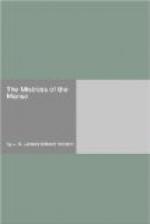“Oh give me vision to divine
What he with delving hand explores!
Feed me with flame that shall refine
To finest gold the rugged ores
His strong hands gather from the mine!
“O dearest Father! May no
sloth,
Or weakness of my weaker soul,
Delay him in his kingly growth,
Or hold him meanly from the goal
That shines with guerdon for us both!”
XIV.
Then all arose as if a spell
Had been dissolved for their release,
The while the benediction fell
Which breathed the gentle Master’s
peace
On all the souls that loved him well.
And Philip, coming from his place,
Like Moses from the mountain pyre,
Bore on his brow the shining grace
Of one who, in the cloud and fire,
Had met his Maker, face to face.
And men and women, young and old,
Pressed up to meet him as he came,
And children, by their love made bold,
Grasped both his hands and spoke his name,
And in their simple language told
Their joy to see his face once more;
While half in pleasure, half in pain,
His bride stood waiting at her door
The passage of the friendly train
That slowly swept the crowded floor.
Half-bows were tendered and returned;
And welcomes fell from lips and eyes;
But in her heart she meekly spurned
The love that came in love’s disguise
Of sympathy—the love unearned.
XV.
Then out beneath the noon-day sun
Of the old Temple, cool and dim,
She walked beside her chosen one,
And lost her loneliness in him;
But hardly was her walk begun
When, straight before her in the street,
With tender shock her eye descried
A little child, with naked feet
And scanty dress, that, hollow-eyed,
Looked up and begged for bread to eat.
Nor pride of place nor dainty spleen
Felt with her heart the sickening shock.
She took the hand so soiled and lean;
And silken robe and ragged frock
Moved side by side across the green.
She looked for love, and, low and wild,
She found it—looking, too,
for love!
So in each other’s eyes they smiled,
As, dark brown hand in snowy glove,
The bride led home the hungry child.
And men and women in amaze
Paused in their homeward steps to see
The bride retreating from their gaze,
Clasped hand in hand with misery;
Then brushed their eyes, and went their
ways.
When the long parley found a close,
And, clean and kempt, the little oaf—
Disburdened of her wants and woes,
And burdened with her wheaten loaf—
Went forth to minister to those
Who sent her on her bitter quest,
The bride stood smiling at her door,
And in her happiness confessed
That she had found a friend; nay, more—
Had entertained a heavenly guest.




